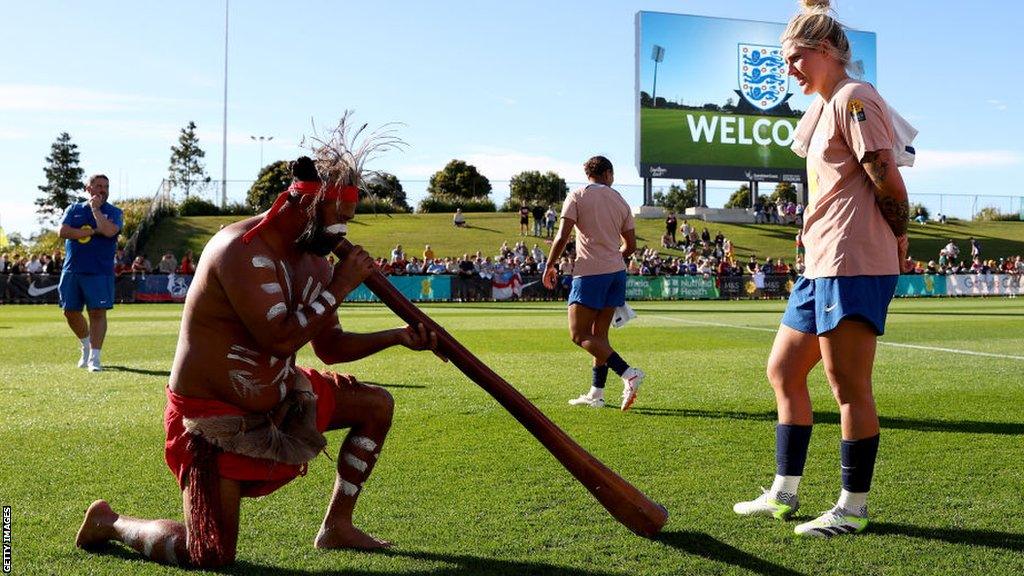Fifa Women's Women Cup: England's Millie Bright to support gender equality and indigenous people
- Published

Millie Bright and her England team-mates were welcomed to Australia with a traditional smoking ceremony
England captain Millie Bright will wear armbands supporting inclusion, indigenous people and gender equality in the Women's World Cup group stage.
Players can choose from eight Fifa-sanctioned armbands, but not the OneLove design that led to Fifa threatening sanctions at the 2022 men's World Cup.
Bright will also support new causes in any knockout games.
"We felt really strongly about all the causes," she said.
"We couldn't separate one from the other. We feel that they are all important and deserve recognition and our support."
The players made a group decision to wear the armbands to highlight a range of social issues.
The messages on the other armbands for the tournament co-hosted by Australia and New Zealand read 'Unite for Peace', 'Unite for Education for All', 'Unite for Zero Hunger', 'Unite for Ending Violence Against Women' and 'Football is Joy, Peace, Hope, Love and Passion'.
Bright will wear the 'Unite for Inclusion' armband when England begin their World Cup campaign against Haiti on Saturday.
"We have only just come to a decision recently as we wanted to take time to process it all and to make sure we spoke collectively," added Chelsea defender Bright, 29.
"Supporting indigenous people is massively important to us as a team, both staff and players. We wanted to come to this country and respect the past, the present and the future.
"We are aware of the past, but we want to move forward collectively and make the world a better place. It is something that we always pride ourselves on."
After arriving in Australia, England hosted an open training session at the Sunshine Coast Stadium where they were welcomed with a traditional smoking ceremony - an Aboriginal custom to wish good luck and ward off bad spirits - led by the Gubbi Gubbi/Kabi Kabi people.
On Wednesday, the players heard from Karen Menzies, the first indigenous player for Australia's Matildas, about the history of and challenges facing the Aboriginal community, as well as reparation efforts.
"We have been honoured with two ceremonies and been able to have conversations and educate ourselves a little bit more on the Aboriginal people," Bright said.
"Everything which comes with the culture is amazing. I think we feel really honoured to have had the opportunity."
'We know the changes we want to make'
Fifa's approved armband plan has been criticised for not doing enough to directly advocate for the LGBTQ+ community, like OneLove's rainbow band.
Fifa said it would impose sporting sanctions if captains wore the armbands during the 2022 World Cup in Qatar, where same-sex relationships and the promotion of same-sex relationships are criminalised.
The Netherlands began the OneLove campaign before Euro 2020 to promote diversity and inclusion, and as a message against discrimination.
LGBTQ+ advocacy non-profit organisation Glaad has reported a record 91 players who are members of the community are expected to participate in the 32-team Women's World Cup.
England coach Sarina Wiegman said she feels her squad, which includes several out players, is satisfied with wearing the Fifa armbands rather than the OneLove design and midfielder Jordan Nobbs said that she and her team-mates "know our values".
Bright added: "As a team, we know what we stand for, what we believe in and we also know the changes that we want to make.
"So regardless of an armband, we would like to think our actions and our morals represent everything that we believe in and stand for."